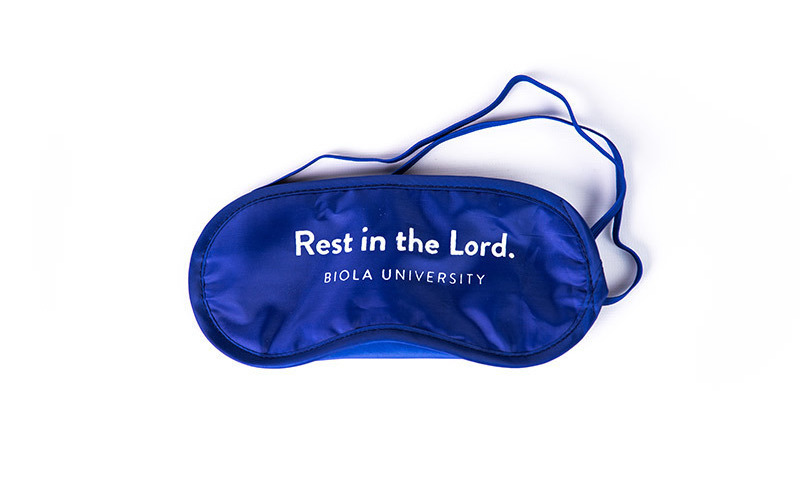“I only got three hours of sleep last night.” “It’s week two and I’ve already pulled three all-nighters.” “Sleep? What even is sleep?” These are all things you might hear walking onto a college campus.
It’s a known fact: Better sleep equals better grades, less anxiety and increased health and happiness — yet most college students do not get enough sleep. Twenty-one percent of Biola undergraduates identify sleep difficulties as impacting their academic work and 28% identify sleep difficulties as being “traumatic or very difficult to handle” (National College Health Assessment, Spring 2018).
Knowing this, the Biola Student Health and Wellness Collaborative introduced Sleep Week — a week designed to help students develop healthy habits, kick off the semester right and reclaim their lives from sleeplessness.
The week began on Feb. 2 after Sunday-night Singspiration — Biola’s all-worship chapel. Students were given milk, cookies and sleep masks as President Barry H. Corey began reading everyone a bedtime story: Goodnight Moon by Margaret Wise Brown. Every night for the rest of the week, students tuned in to Biola’s Instagram to hear Corey finish Goodnight Moon and read Where the Wild Things Are by Maurice Sendak.
On Monday, students played with Huxley the healing harley — Biola’s new therapy dog — to relieve stress and have some fun. On Tuesday and Thursday, the Mosaic Cultural Center was transformed into an all-day nap corner — equipped with a zero gravity chair, humidifiers and blankets — so students could get their daily power naps. Students were offered free 10-minute massages and, all week, different Biola groups competed for who could get the most 8-hour nights of sleep. Meanwhile, Sleep Week stayed firmly rooted in Scripture as chapels explored the value of sleep from a biblical perspective, teaching that sleep is a gift from God that can be used worshipfully to glorify him.
– Zachariah Jimison
Photo by Cassandra Ashlyn Tancinco
SLEEP HACKS
Use Google Calendar. Blocking out time for classes, homework, self-care and social time can help you get a handle on your week.
Make lists. Write out what you need to do. Get what’s in your head on paper. If it’s out of your head, you won’t have to stay up thinking about it. You’ll be less stressed and more able to focus on the task at hand.
Establish a regular bedtime.
Exercise early in the day. Regular exercise will help you sleep better at night and be more awake during the day. It’s also a great stress-reliever.
Shower before bed. Showering is proven to slow breathing and reduce anxiety.
Put blackout curtains on your windows.
Put your phone down 15 minutes before bed. And don’t pick it up again! Buy an alarm clock so you can store your phone away from your bed at night.
 Biola University
Biola University



